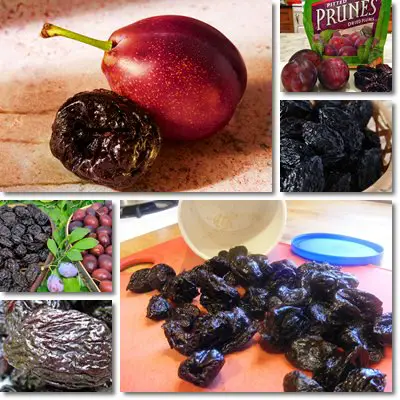Prunes or dried plums are a sweet, nutritious treat with great antioxidant properties. They a wonderful source of vitamins and minerals and contain generous amounts of polyphenols, powerful antioxidant compounds found naturally in plants.
In addition to this, dried plums promote and maintain digestive health, making them a good food to eat for anyone dealing with minor or major stomach discomfort, chronic constipation or slow transit time.
As a natural source of sugar and carbohydrates, they contribute to elevated energy levels, whilst exercising a tonic action as a result of a good vitamin and mineral profile.
Dried plums: nutrition facts, benefits and uses
Dried plums are definitely a good choice if you are looking to make some healthy dietary changes. Most people associate dried plums with a diet for the elderly and, as a consequence, they tend to completely disregard their health benefits.
They are not for the elderly alone. Dried plums constitute a nutritious food, recommended for all ages. They are nutritious as a snack as they are, but they also make a wonderful stuffing for sour cabbage leaves, grapevine leaves and semolina dumplings. You can make a delicious sweet cream soup out of them or an exquisite quiche as they cater to both soul food and fancy cuisine.
But overall dried plums are nutritious and are best consumed as they are.

Although they may appear unappealing to some, few people have ever given them a chance. Modern diets tend to overwhelm us with mostly crunchy, salty, dry textures in food so naturally, a soft, chewy, sweet food does not fit the mold of processed items and may be regarded as unpalatable. But does that really mean you won’t like dried plums? Actually, they don’t just taste great, flavorful and sweet-astringent, but they’re also extremely healthy and bring a much needed balance to our modern diets in the form of essential vitamins and minerals such as potassium, B vitamins and vitamins A and K, not to mention outstanding amounts of dietary fiber.
Dried plums are full of natural sugars, providing around 38 g of sugars/100 g of fruit. When the fresh plum is put to dry, its mass reduces but it preserves the same amount of sugars, meaning that the dry version is actually much sweeter than the fresh fruit, just not very juicy because it loses its water content. The natural sugars in the dry fruit make it an excellent desert option and hypoglycemia emergency food, especially considering it stacks even more vitamins and dietary minerals than the fresh fruit.
Because they lack water, dry plums tend to have a soft, chewy texture, which is why they are especially recommended for older people who may have lost their teeth or are using dentures and thus may find many foods difficult to chew. They are just as good for small children who lack strong jaws to chew on hard foods. But do you actually imagine that toddlers would eat something unappetizing? Of course not! Dry plums are sugary, natural, soft and fragrant and if children like them, then why wouldn’t an adult come to appreciate their unique flavor? More important, they are a rich source of essential nutrients.

Dried plums are a great source of dietary fiber (approximately 7.1 g of fiber/100 g of pulp). If you are dealing with constipation on a regular basis, then you need to add more fiber into your diet. Eat a small cup of Greek yogurt and oats in the morning, add a few chopped almonds or a teaspoon of sesame seeds to your lunch salad and eat 6-7 dried plums if you crave something sweet in the afternoon and you have yourself the perfect recipe for easy and soft bowel movements for constipation relief and hemorrhoids management (see what foods to eat and to avoid for hemorrhoids).
Just as important: because fiber soaks up water, you need to drink more liquids when raising your fiber intake. Maintain a similar routine for less than a week and you will definitely see major improvements in your digestive health. Fiber-rich foods such as dried prunes are a potent natural laxative and thus encourage you to take regular trips to the bathroom as well as ensure you spend less time there every time you go. But make sure you don’t eat too many or else you will have to take a few unplanned trips to the bathroom.
Because they contain natural sugars and good amounts of B vitamins, dried plums help maintain good energy levels. Eating a few when you are feeling lethargic will help improve your spirits. Prunes are also a wonderful source of vitamin K, responsible for calcium absorption in bones and blood coagulation. In addition to this, vitamin K prevents atherosclerosis, a condition in which calcium fragments deposit on artery walls, which may lead to increased risk of stroke and other cardiovascular events.
Other benefits of dried plums are related to their high dietary mineral content. Magnesium, manganese, iron, phosphorus and potassium contribute to healthy muscles, good energy levels, strong teeth and bones, normal growth and development in children and cardiovascular health. The fruit are a particularly rich source of potassium (732 mg of potassium per 100 g of prunes) and contribute to lowering high blood pressure. If you take a chance, you will surely find dried plums absolutely delicious. After all, they are the healthier dried version of the fresh fruit.
